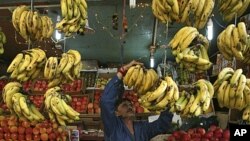In India, increasing food and fuel prices have raised worries that Asia's third largest economy may slow down more than expected. The numbers indicate the Indian government's efforts to tame inflation in the past year have not yet succeeded.
The commerce ministry says food inflation last week was over 12 percent - the highest level in the past nine months. This was largely due to rising prices of meat, milk and vegetables.
State-owned oil companies also increased gasoline prices by about 2.5 percent on Friday - the fourth increase this year.
The rising food and fuel prices are slowing down the economy.
An economist at the National Council of Applied Economic Research in New Delhi, Anushree Sinha, says the impact is already apparent.
"The industrial sector has already been clocking deceleration in their growth. Industry is definitely not seeing the growth it should. Our manufacturing sector is not doing well which is a cause of concern," said Sinha.
The loss of economic momentum is primarily blamed on a series of interest rate hikes by the Reserve Bank in the past year. The hikes were meant to ease inflation by curbing consumer demand, but has had virtually no impact so far.
Several economists say the government is looking in the wrong direction. They say food prices are climbing due to changing patterns of consumption in a country where high growth has increased the numbers of affluent people, and raised demand for items like meat, milk and fruit.
D.H. Pai Panandiker, who heads the economic think tank, RPG Goenka Foundation in New Delhi, says the government needs to focus on policies that will raise production of these items.
"The government should have intervened to see that the supply of these commodities increases, which it has not done. Milk and the dairies, the poultry farming and all kinds of things could have been given more facilities in order that they expand very fast. That would have been the principle solution to this problem and not really the interest hike," said Panandiker.
The government says it is optimistic that the economy will grow at around 8 percent, but several economists are revising this figure downwards to around 7.5 percent.
Economist Sinha says this is not good for a country where high growth is needed to cut poverty.
"The problem is, it’s going to impact hugely a large number of people…fewer jobs created, and also incomes being eroded," said Sinha.
The rising fuel and food prices also pose political problems for the Congress Party-led government. Both allies and the opposition have attacked the government for failing to tame inflation. The higher prices are also fueling popular anger.
Rising Food, Fuel Prices Slow Indian Economy




